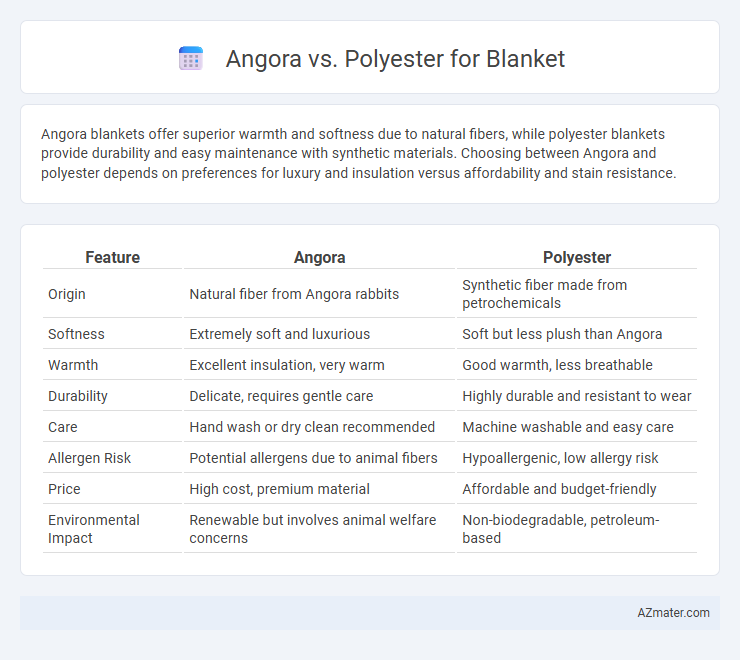Angora blankets offer superior warmth and softness due to natural fibers, while polyester blankets provide durability and easy maintenance with synthetic materials. Choosing between Angora and polyester depends on preferences for luxury and insulation versus affordability and stain resistance.
Table of Comparison
| Feature | Angora | Polyester |
|---|---|---|
| Origin | Natural fiber from Angora rabbits | Synthetic fiber made from petrochemicals |
| Softness | Extremely soft and luxurious | Soft but less plush than Angora |
| Warmth | Excellent insulation, very warm | Good warmth, less breathable |
| Durability | Delicate, requires gentle care | Highly durable and resistant to wear |
| Care | Hand wash or dry clean recommended | Machine washable and easy care |
| Allergen Risk | Potential allergens due to animal fibers | Hypoallergenic, low allergy risk |
| Price | High cost, premium material | Affordable and budget-friendly |
| Environmental Impact | Renewable but involves animal welfare concerns | Non-biodegradable, petroleum-based |
Introduction to Angora and Polyester Blankets
Angora blankets, crafted from the soft and luxurious hair of Angora rabbits, offer exceptional warmth, breathability, and natural hypoallergenic properties, making them ideal for sensitive skin and cold climates. Polyester blankets, made from synthetic fibers, provide durability, moisture resistance, and affordability while maintaining easy care and vibrant color retention. Both materials cater to different user preferences, with Angora emphasizing natural comfort and polyester focusing on practicality and cost-effectiveness.
Material Origins: Natural vs Synthetic
Angora fibers originate from the Angora rabbit, offering a natural, renewable source known for exceptional softness and warmth, with inherent breathability and moisture-wicking properties. Polyester is a synthetic fiber derived from petrochemicals, engineered for durability, wrinkle resistance, and easy care but lacks the natural temperature regulation found in Angora. Choosing between Angora and polyester blankets depends on preferences for natural luxury and sustainability versus affordability and maintenance convenience.
Softness and Comfort Comparison
Angora blankets offer exceptional softness and luxurious comfort due to the fine, silky fibers sourced from Angora rabbits, providing excellent warmth without heaviness. Polyester blankets, while durable and affordable, typically lack the natural softness and breathability of Angora, often feeling synthetic and less comfortable against the skin. In terms of softness and comfort, Angora is preferred for a cozy, plush experience, whereas polyester is a practical option for those seeking easy care and affordability.
Warmth and Insulation Properties
Angora blankets offer superior warmth and natural insulation due to their fine, hollow fibers that trap heat efficiently, providing excellent thermal regulation even in cold conditions. Polyester blankets, while often less breathable, retain warmth well through synthetic fiber construction but can sometimes cause overheating or lack moisture-wicking abilities. Choosing Angora ensures maximum heat retention with natural breathability, whereas polyester blankets deliver durable warmth with lower cost and easier maintenance.
Durability and Longevity
Angora blankets offer exceptional durability due to the resilience of angora fibers, which can withstand regular use without losing softness or shape. Polyester blankets are highly durable as well, known for their resistance to wear, tear, and pilling, making them ideal for long-term use in high-traffic environments. While polyester blankets maintain their structural integrity over time, angora provides a natural elasticity that helps preserve blanket longevity under consistent wear.
Allergenicity and Skin Sensitivity
Angora fibers are naturally hypoallergenic, making them an excellent choice for individuals with sensitive skin or allergies, as they resist dust mites and bacteria buildup. Polyester blankets, while durable and affordable, tend to trap heat and moisture, which can exacerbate skin irritation and allergenic reactions in sensitive users. Choosing Angora reduces the risk of allergic responses thanks to its breathable, soft texture, whereas polyester may require extra care to minimize skin sensitivity issues.
Maintenance and Cleaning Requirements
Angora blankets require gentle hand washing or dry cleaning due to their delicate fiber structure, which can easily felt or shrink if exposed to hot water or aggressive detergents. Polyester blankets offer more convenient maintenance, tolerating machine washing and quick drying without losing shape or texture, making them ideal for households seeking low-effort care. Proper storage of Angora blankets in breathable bags is essential to prevent moth damage, whereas polyester's synthetic fibers naturally resist pests and odors.
Eco-Friendliness and Sustainability
Angora blankets offer superior eco-friendliness compared to polyester, as they are made from natural, renewable fibers derived from Angora rabbits, which are biodegradable and have a lower environmental footprint during production. Polyester blankets rely on synthetic materials derived from petroleum, contributing to non-biodegradable waste and higher greenhouse gas emissions throughout their manufacturing process. Choosing Angora supports sustainable practices by promoting animal welfare and reducing reliance on fossil fuels, while polyester's environmental impact raises concerns about microplastic pollution and resource depletion.
Cost and Value Analysis
Angora blankets typically command a higher price due to the labor-intensive harvesting of angora fibers and their superior softness, warmth, and natural breathability compared to polyester. Polyester blankets offer a more budget-friendly option with durable, easy-care qualities but lack the luxury feel and thermal insulation properties of angora. Evaluating cost against value, angora provides long-term comfort and premium feel for investment buyers, while polyester suits cost-conscious consumers prioritizing affordability and low maintenance.
Which Blanket Material is Best for You?
Angora blankets offer exceptional softness, warmth, and natural breathability, making them ideal for those seeking a luxurious and cozy feel, especially in colder climates. Polyester blankets provide durability, affordability, and easy maintenance, suitable for allergy sufferers and individuals wanting a lightweight, hypoallergenic option. Choosing between Angora and Polyester depends on your preference for natural fibers and insulation versus practicality and budget-friendly care.

Infographic: Angora vs Polyester for Blanket
 azmater.com
azmater.com